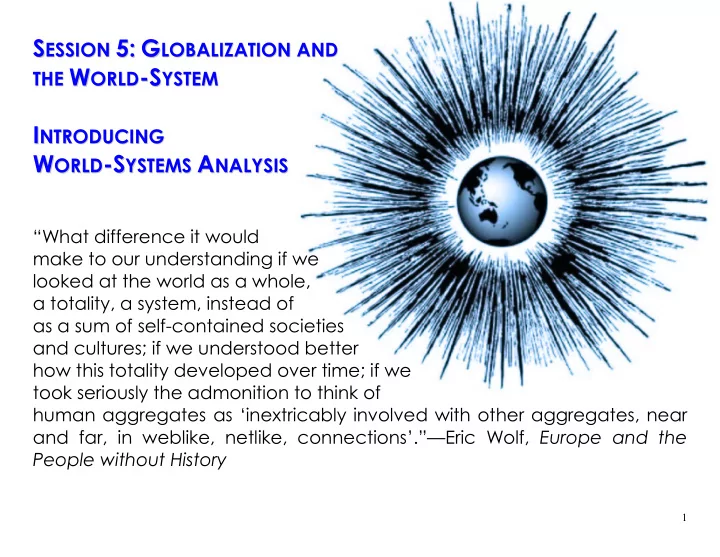

S E 5: : G L S 5 G D ES SS SI IO ON N LO OB BA AL LI IZ ZA AT TI IO ON N A AN ND W O -S S Y W D - M TH HE E OR RL LD YS ST TE EM T I N I NT TR RO OD DU UC CI IN NG G W O -S S Y A N W D - A S OR RL LD YS ST TE EM MS S NA AL LY YS SI IS “What difference it would make to our understanding if we looked at the world as a whole, a totality, a system, instead of as a sum of self-contained societies and cultures; if we understood better how this totality developed over time; if we took seriously the admonition to think of human aggregates as ‘inextricably involved with other aggregates, near and far, in weblike, netlike, connections’.”—Eric Wolf, Europe and the People without History 1
A C RITIQUE OF M ODERNIZATION T HEORY Walt W. Rostow-- 1960, The Stages of Economic Growth: A Non-Communist Manifesto-- universal stages through which all societies go in achieving economic growth and development—progress, evolutionism Modernization Theory (Developmentalism) “Why was the Third World failing to develop according to expectations?” Impediments to a universal process of transformation: cultural backwardness the predominance of tradition the lack of a Need to Achieve the failure to think in terms of progress Assumption: nation-states act autonomously 2
T HE L ATIN A MERICAN T HESIS : D EPENDENCY T HEORY 1950s—1970s, Latin American economists, historians, sociologists Raul Prebisch, UN Economic Commission for Latin America: The Economic Development of Latin America and its Principal Problems What Modernization Theory ignored: a) Latin America had over a century of foreign private investment b) Modern state structures copied from Europe and the US c) Extensive trade d) European immigrants Explanation? unequal trade, net capital loss foreign investment in natural resource extraction dependence on manufactured imports 3
A NDRE G UNDER F RANK development of underdevelopment capitalism and imperialism against EUROCENTRIC analyses metropolis-satellite 4
underdevelopment is not “local”: the product of incorporation into world capitalism Walter Rodney Samir Amin 5
W ORLD -S YSTEMS A NALYSIS Immanuel Wallerstein on world political-economic history, 1970s— (1) net drain of capital from the underdeveloped world (2) basic division in the world between core and periphery Unit of analysis? The capitalist world- system, came into being with colonial expansion of Europe Critique of state-centrism Critique of Marxist conceptions of capitalism Capitalism is not a mode of production: world-wide system of exchange 6
Defining feature: global circulation of commodities Commodity: any object that can be sold for a profit World capitalism results in commodification of everything Market exchange: central feature of global capitalism Production is for the market Essentials of life, not just luxuries, sold in the market Centre and a periphery: surplus accumulated in the centre, away from the periphery = a single axial division of labour 7
8
Basic premises of World-Systems Analysis: 1. ceaseless accumulation of capital 2. division of labor along center-periphery lines 3. boundary correspondence between capitalist world-economy and interstate system 4. origins lie in sixteenth century 5. began in Europe, expanded via incorporations 6. Particular states experienced periods of hegemony 7. States, ethnic groups, households possess only a “nonprimordial character” 8. Racism & sexism = fundamental organizing & disciplining principles 9. Antisystemic movements arise to challenge the system 9
How change occurs repetition (recursion): cyclical unidirectional and irreversible changes: secular “long waves”: cyclical processes played out in tune with secular trends cyclical processes : rise and fall of hegemons warfare forty to sixty year business cycle colonization and decolonization hegemony and decline 10
secular trends : long-term proletarianization of world work force, growing concentration of capital, increasing internationalization of capital investment & trade, accelerating internationalization of political structures. new cycles bring about small but significant structural shifts The modern world-system is finite in duration kairos , the time of change—bifurcation 11
12
13
C ULTURE AND THE W ORLD -S YSTEM Liberalism, the geoculture of the world-system Culture: universalizing & particularizing Culture as the ideological battleground of the modern world-system R EVOLUTIONS AND A NTI -S YSTEMIC M OVEMENTS “World revolutions”, 1848, 1968-89 Old vs. new anti-systemic movements Problem of capturing state power 1968, rebellion against the old left; disillusion with the state; “the forgotten peoples” 14
Recommend
More recommend